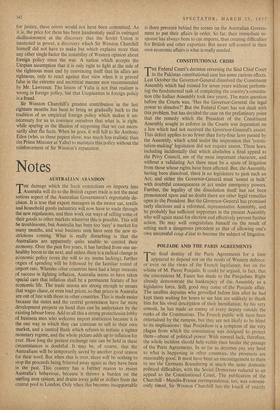CONSTITUTIONAL CRISIS T HE Federal Court's decision reversing the Sind Chief
Court in the Pakistan constitutional case has some curious effects. Last October the Governor-General dissolved the Constituent Assembly which had existed for seven years without perform- ing the fundamental task of completing the country's constitu- tion (the Indian Assembly took two years). The main question before the Courts was, 'Has the Governor-General the legal power to dissolve?' But the Federal Court has not dealt with this problem, but has decided the case on the preliminary point that the remedy which the President of the Constituent Assembly sought to enforce in the Courts was dependent on a law which had not received the Governor-General's assent. This defect applies to no fewer than forty-four laws passed by the Assembly, which acted under the impression that 'consti- tution-making' legislation did not require assent. These laws, including incidentally that which abolishes a final appeal to the Privy Council, are of the most important character, and without a validating Act there must be a spate of litigation from those whose rights have been affected. But, the Assembly having been dissolved, there is no legislature to pass such an Act; and either the Governor-General must 'assent in bulk' with doubtful consequences or act under emergency powers. Further, the legality of the dissolution itself has not been pronounced upon and no doubt there are other legal remedies open to the President. But the Governor-General has promised early elections and a reformed, representative Assembly, and he probably has sufficient supporters in the present Assembly who will again stand for election and effectively prevent further action. He may well congratulate himself on the result of setting such a dangerous precedent as that of allowing one's own successful coup d'etat to become the subject of litigation.


































 Previous page
Previous page